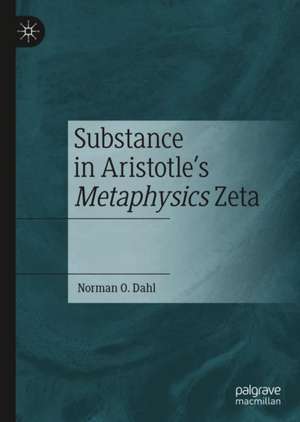Substance in Aristotle's Metaphysics Zeta
Autor Norman O. Dahlen Limba Engleză Hardback – 9 sep 2019
.
| Toate formatele și edițiile | Preț | Express |
|---|---|---|
| Paperback (1) | 584.76 lei 6-8 săpt. | |
| Springer International Publishing – 9 sep 2020 | 584.76 lei 6-8 săpt. | |
| Hardback (1) | 590.16 lei 6-8 săpt. | |
| Springer International Publishing – 9 sep 2019 | 590.16 lei 6-8 săpt. |
Preț: 590.16 lei
Preț vechi: 694.31 lei
-15% Nou
Puncte Express: 885
Preț estimativ în valută:
112.94€ • 116.67$ • 93.100£
112.94€ • 116.67$ • 93.100£
Carte tipărită la comandă
Livrare economică 25 martie-08 aprilie
Preluare comenzi: 021 569.72.76
Specificații
ISBN-13: 9783030221607
ISBN-10: 3030221601
Pagini: 276
Ilustrații: XII, 354 p.
Dimensiuni: 148 x 210 mm
Greutate: 0.59 kg
Ediția:1st ed. 2019
Editura: Springer International Publishing
Colecția Palgrave Macmillan
Locul publicării:Cham, Switzerland
ISBN-10: 3030221601
Pagini: 276
Ilustrații: XII, 354 p.
Dimensiuni: 148 x 210 mm
Greutate: 0.59 kg
Ediția:1st ed. 2019
Editura: Springer International Publishing
Colecția Palgrave Macmillan
Locul publicării:Cham, Switzerland
Cuprins
Chapter 1: Introduction.- Chapter 2: Background Considerations.- Chapter 3: The Categories View of Basic Constituents.- Chapter 4: Two New Candidates for Basic Constituents.- Chapter 5: The Metaphysics and Metaphysics Zeta.- Chapter 6: Z.1, Substantial Forms or Individual Composites as Basic Constituents.- Chapter 7: Z.3, The Rejection of Matter.- Chapter 8: Z.4-5, Essence.- Chapter 9: Z.6 and the Pale Man Argument.- Chapter 10: Z.6 and the Argument About Platonic Forms.- Chapter 11: Z.6 and the Regress Argument.- Chapter 12: Z.7-9, The Reintroduction of Matter and Form.- Chapter 13: Z.10-11, Does Form Have Matter as Part of It?.- Chapter 14: The Universal as Substance: Z.13 1038b8-1039a3 – Problems of Interpretation.- Chapter 15: The Universal as Substance: 1038b8-1039a3 -- Solutions to the Problems.- Chapter 16: The Universal as Substance: Z.13-16 -- An Aporia and What Follows.- Chapter 17: Z.17, A Fresh Start.- Chapter 18: Conclusion.
Notă biografică
Norman O. Dahl is Emeritus Professor of Philosophy at the University of Minnesota. His main interests are moral philosophy and ancient philosophy. In the latter area he is the author of Practical Reason, Aristotle, and Weakness of the Will (1984), articles on Metaphysics Zeta, and publications on Aristotle’s ethics and Plato’s ethics.
Textul de pe ultima copertă
This book argues that according to Metaphysics Zeta, substantial forms constitute substantial being in the sensible world, and individual composites make up the basic constituents that possess this kind of being. The study explains why Aristotle provides a reexamination of substance after the Categories, Physics, and De Anima, and highlights the contribution Z is meant to make to the science of being. Norman O. Dahl argues that Z.1-11 leaves both substantial forms and individual composites as candidates for basic constituents, with Z.12 being something that can be set aside. He explains that although the main focus of Z.13-16 is to argue against a Platonic view that takes universals to be basic constituents, some of its arguments commit Aristotle to individual composites as basic constituents, with Z.17’s taking substantial form to constitute substantial being is compatible with that commitment.
Caracteristici
Argues for an interpretation of Z that runs against the current of most contemporary scholarship Offers a brief indication of the problems that arise in trying to understand Z and what can be done to solve them Written for those with a substantial interest in ancient philosophy, especially those concerned with Aristotle and his metaphysics
